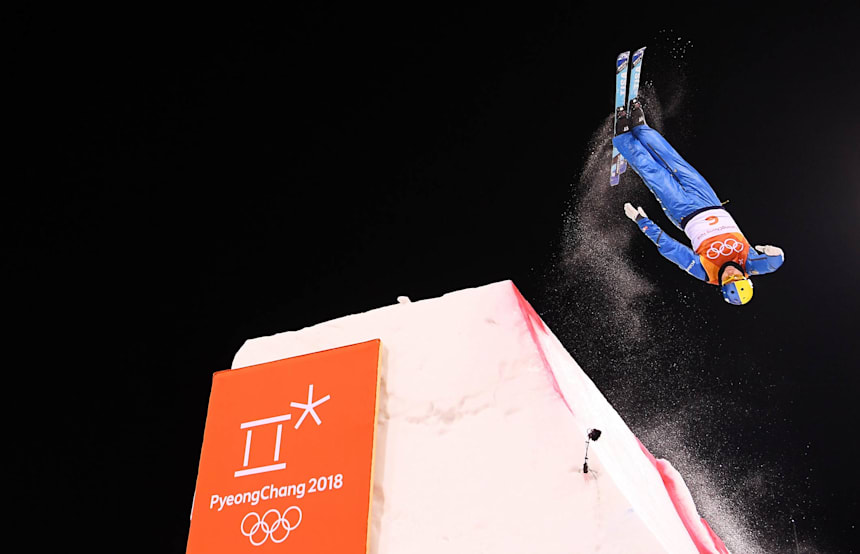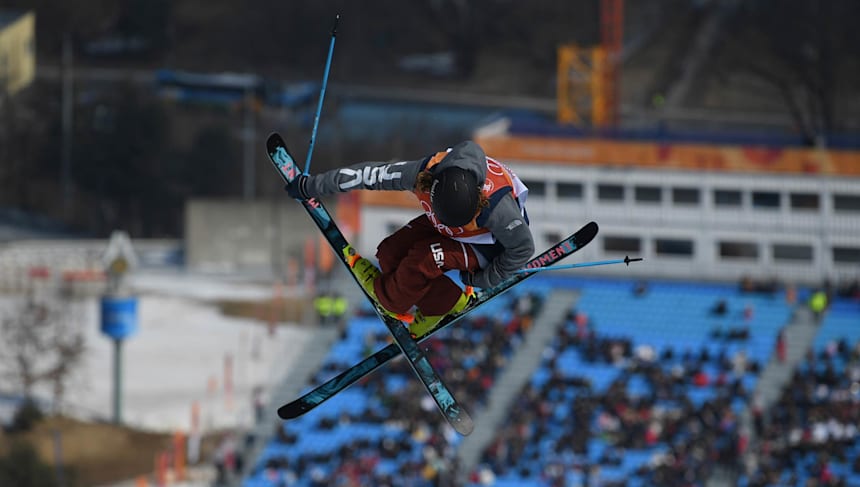Men’s freestyle skiers fly high at Phoenix Snow Park
Canadian moguls master Mikael Kingsbury finally ended his quest for Olympic gold, while the USA’s David Wise retained his halfpipe crown. Norway’s Øystein Braaten reigned supreme in the slopestyle, another Canadian, Brady Leman prevailed in the ski cross and Oleksandr Abramenko won the aerials to give Ukraine just its third ever Winter Olympic gold.
Kingsbury secures elusive moguls title
After narrowly missing out four years earlier, Canada’s Mikael Kingsbury, the world’s best moguls exponent, produced a magnificent run in the super final on 12 February to top the podium ahead of Australia’s Matt Graham and Daichi Hara of Japan. Kingsbury has a track record like few other winter athletes: his 87 World Cup starts have yielded 48 victories and 70 podiums, contributing to six overall World Cup titles; he also boasts seven world championship medals. But the 25-year-old was without an Olympic title going into PyeongChang 2018.
At the age of nine he had apparently stuck up a picture of the Olympic rings in his bedroom and written on it: “I’m going to win.” At Sochi 2014, he had seen that goal foiled by compatriot Alexandre Bilodeau, who edged him into second place. It was clear that this time around he was in no mood to allow a repeat.
However, he found himself lying fourth after the first stage of the three-phase final. Second after the penultimate stage, he then produced his best run of the competition, turning up the tempo and conjuring two huge jumps as he navigated the moguls with a faultless display. His score of 86.63 put him well beyond reach. Graham scored 82.57 to hand Australia their first medal of the Games, just ahead of bronze medallist Hara (82.19).
“I’ve been dreaming of this moment since I was eight. Today my dream has come true and it’s the best day of my life,” said Kingsbury. “I’ve won so many World Cup races in my career but winning this is different. It’s one evening every four years, and I’ve shown I can do it. And I’ll be an Olympic champion for the rest of my life.”
Braaten turns on the slopestyle
On a challenging course at the Phoenix Snow Park, Norway’s Øystein Braaten demonstrated superb technique and no shortage of imagination to win the men’s slopestyle final on 18 February. After the field was whittled down to the best 12 boarders, the 22-year-old produced a near immaculate first run that earned him a score of 95.00, which was good enough to put him onto the top of the podium ahead of the USA’s Nick Goepper (93.60) and Canadian Alex Beaulieu-Marchand (92.40)
"My first run went exactly to plan,” said Braaten. “I managed to do exactly what I wanted to do as well as possible. The standard of competition was so high. I was inspired by a lot of the other guys. For me it was a huge thing just to be able to compete against all these guys.
He became only the third Norwegian, and the first male, to win a freestyle ski gold at the Winter Games, after Stine Hattestad (1994) and Kari Traa (2002), who both won the women’s moguls.
Meanwhile, 23-year-old Goepper, an X Games champion in 2015, botched his first two runs but then produced a sublime third to secure the silver, to go with his bronze at Sochi 2014.
Abramenko claims first Winter gold for Ukraine
Later that day, under the floodlights at Phoenix Snow Park, Ukraine’s Oleksandr Abramenko won the men’s aerials super final, edging out China’s Jia Zongyang, who took silver to go with the bronze he won at Sochi 2014. This time around the bronze went to Ilia Burov (OAR).
All three medallists pulled off a spectacular back-full-full-double-full in the super final but it was Abramenko’s effort that impressed the judges most as he scored 128.51 points, 0.46 more than Zongyang, while Burov scored 122.17.

Abramenko became Ukraine’s first male gold medallist at the Winter Games, and just the country’s third in all, joining figure skater Oksana Baiul (Lillehammer 1994) and the women’s biathlon 4x6km relay team who won gold at Sochi 2014.
“I was hoping to win a medal, but to get the gold is unthinkable,” said the newly crowned champion who described his winning jump as one of the best of his career. “I’ve dreamed of this moment since I was a kid when I first started out. Now the dream has come true.”
Long-suffering Leman keeps his cool to win ski cross gold
Canada’s Brady Leman emerged victorious in an incident-packed men’s ski cross final, seeing off the challenge of Swiss skier Marc Bischofberger. Sergey Ridzik (OAR) took the bronze.
The 32-year-old Leman brought all his experience to bear on a fast and challenging course. Heartbreakingly, the Canadian had missed out on the event’s Olympic debut at Vancouver 2010 when he broke his arm just before the Games. Four years later he just missed out on the medals, finishing fourth after a fall. This time round, he made sure to minimise the risk of a repeat by racing into an early lead.
It proved a wise move as the four-strong final was reduced to two after Leman’s compatriot Kevin Drury collided with Sergey Ridzik (OAR), who managed to get back onto his skis and complete the race to take the bronze. That left Leman in a duel with Bischofberger for the gold, and he was not going to be short-changed this time around. Having never previously finished on an Olympic or world championship podium before, and with just two World Cup second places to his name, Leman was clearly delighted to get his breakthrough title on the biggest stage of all.
“This is something I’ve worked so hard for,” said the Canadian. “It represents years of effort, particularly over the last four years since Sochi. The fact I’ve managed to bounce back and stay strong and confident in my abilities is something I’m especially proud of.”
Reigning champion Wise retains halfpipe crown
The men’s freestyle ski programme came to a close on 22 February with the halfpipe, where the USA’s David Wise completed a successful defence of the title he won at Sochi 2014 thanks to a near-perfect third run that scored 97.20. Wise’s fellow American Alex Ferreira, who had arrived at the Games at the top of the World Cup leaderboard, delivered a wonderfully executed second run that was deemed worthy of silver (96.40). Meanwhile, 16-year-old New Zealander Nico Porteous (94.80) produced a major surprise by landing the bronze.
So often in a league of his own, the 27-year-old Wise didn’t make life easy for himself at the Phoenix Snow Park, wiping out during his first two runs, which paved the way for Ferreira to move into pole position with one run remaining. However, with the pressure on him, the reigning champion turned up the difficulty levels and turned on the style. Back-to-back 1080 turns, the second a reverse ‘switch’, and then two double cork 1260s were enough to convince the judges to award him the top score. After two seasons dogged by injuries, it was a particularly gratifying return to the top rung of the podium.

“Today was incredible. The way Alex [Ferreira] put down all his runs, and the standard during qualifying – all that inspired me,” said Wise. “Win or lose, I just wanted to put down a run, and I managed to do it just when I needed it most.”
The contest for bronze was played out between Porteous and fellow New Zealand teenager Beau-James Wells, with the former clinching it thanks to a scintillating final run. At the age of 16 years and 91 days, and having never featured on a major podium previously, he duly became his country’s youngest ever Olympic medallist.